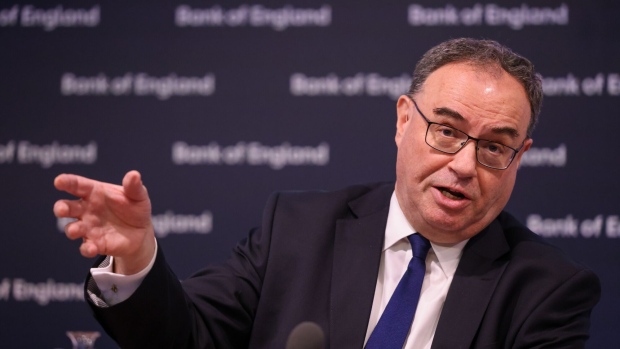Apr 16, 2024
Bailey Hints BOE May Be Able to Cut Rates Before Fed
, Bloomberg News

(Bloomberg) -- Bank of England Governor Andrew Bailey hinted that the UK might be able to lower interest rates before the US, saying inflation dynamics in the two economies are diverging.
Bailey said on Tuesday that there is more “demand-led inflation pressure” in the US than seen in the UK after markets were spooked by surprisingly strong price data in America last week. He said there is “strong evidence” of UK price pressures retreating.
“The dynamics of inflation are rather different between Europe — I mean Europe geographically now — and in the US,” he said in an interview with the International Monetary Fund. In the UK “we’re still seeing the extension of the process of coming out of the big supply shocks, the impact of the war, the impact of coming out of Covid.”
The remarks suggest that Bailey sees little threat of the UK also suffering a similar resurgence in inflation that was seen in US price data for March last week. Bailey’s words contrasted with those of Fed Chair Jerome Powell, who said on Tuesday that recent inflation data indicated that it will take longer for US officials to have the confidence they need to lower interest rates.
Stronger inflation readings in the US led to a reassessment by traders of when central banks globally will begin a cycle of monetary easing. The result has led to some speculation that the BOE or European Central Bank could cut before the US Federal Reserve. But investors have also pushed back the date of the first move in the UK.
The timing of the first cut is almost fully priced in for September and has been pushed back from August over recent weeks. Markets only see 41 basis points of cuts from the BOE this year, compared with around three quarter point reductions earlier this month.
BOE officials including Catherine Mann, Jonathan Haskel and Megan Greene have cautioned that they have lingering concerns about price pressures in the economy. Data Tuesday showed wages excluding bonuses are still rising at a faster-than-expected annual rate of 6% — but also revealed an unexpected jump in unemployment.
Economists expect UK inflation to ease from 3.4% to 3.1% in data for March out Wednesday morning.
Bailey said there are “very encouraging signs” for the global economy as price pressures recede.
“We’re seeing resilience in activity in the world economy, but we’re seeing disinflation,” he said. “In the UK, we’re dis-inflating at what I call full employment. But I see strong evidence now that that process is working its way through.”
The pound was little changed immediately following Bailey’s remarks, remaining 0.1% down at $1.2430.
Bailey also said that fragmentation in the world economy is a “serious problem” and makes it “more susceptible to supply shocks.”
“I’m a very, very strong personal believer in free trade, but I recognize that the experiences we’ve had means that we need to diversify to get more resilience in our trade and international connections.”
--With assistance from Constantine Courcoulas and Craig Torres.
©2024 Bloomberg L.P.






